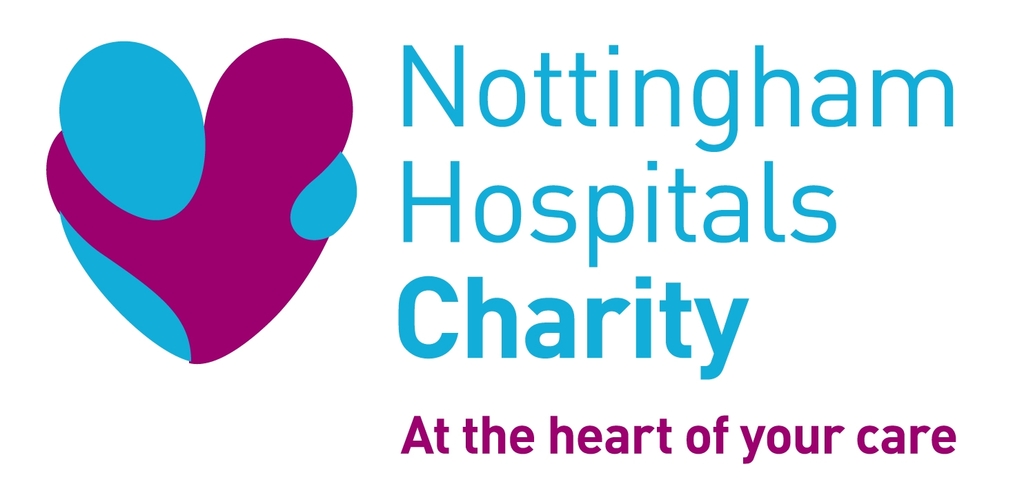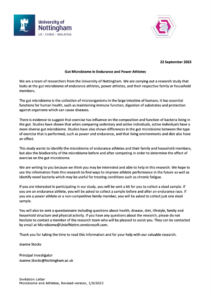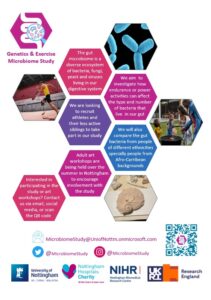
Genetics and Exercise Microbiome (GEM) Study: Investigating Microbiome Diversity in the UK Population
Funded by Nottingham Hospitals Charity – Nottingham Orthopaedic Walk Fund
Principal Investigator: Dr Joanne Stocks
Start Date: September 2023.
Thanks to funding from Research England we will be holding adult art and cookery workshops in Nottingham during July – October 2023 to discuss how lifestyle habits such as diet and exercise might impact the diversity of bacteria in our guts. In particular, we will be encouraging people of the Black Diaspora to be involved in how we can recruit people from diverse backgrounds to the study and also suggest ideas for the direction of future research.
Research funded by

Public Engagement Art and Cooking Workshops Funded by

Watch the video below to learn about our research.
The gut microbiome is a vast ecosystem of microorganisms such as bacteria, yeasts, fungi and viruses which live in our digestive tracts.
Gut microbes are key to many aspects of human health including the development of obesity, maintaining the immune system, increasing skeletal muscle mass, and influencing the development of inflammatory arthritis.
Studies in human twins have shown that, although there is a heritable component to gut microbiota, environmental factors related to diet, drugs, and body size and shape measurements are larger determinants of microbiota composition.
Investigating the effect of endurance and power athletic training on gut microbiome composition
There is evidence to suggest that exercise exerts some influence over the gut microbial composition and function, and that many of the compositional changes seen in gut microbiome associated with exercise are of benefit to the host.
The compositional changes associated with regular physical activity include microbial diversity and increased abundance of beneficial bacteria.
However, the influence of different types of exercise, such as power and endurance, on the gut microbiota and the difference compared to the microbiota of sedentary individuals is unknown.
We are undertaking a pilot study to compare endurance athletes’ bacterial strains with bacterial strains from power athletes, specifically sprinters.
We are also investigating whether genetics or environment are involved in the composition of the microbiome, through asking non-competitive siblings, parents or housemates of the athletes to donate a stool sample.
Thus, this study will look at the adaptions of the microbiome with respect to training and diet.
Investigating the gut microbiome composition of a UK Afro-Caribbean cohort
Current research often uses a predominantly Caucasian study population. Elite sprint athletes often have an Afro-Caribbean background and we also wish to recruit parents, siblings and household members of these athletes to provide a stool sample for analysis.
This will lead to the possibility of many different analyses; to see if genetics, ageing or envioronment are involved in the differences in gut microbiota; if different diets containing alternative probiotic foods have an influence compared to traditional British diets; and also through comparing with the Caucasian population to see if ethnicity plays a role in musculoskeletal conditions such as osteoarthritis, fatigue or frailty.
If you are interested in learning more about the study and how to take part please read the Invitation to GEM study PDF and the Participant Information Sheet .
If you have more questions or want to take part then use the contact form, email MicrobiomeStudy@UniofNottm.onmicrosoft.com or follow us on social media


